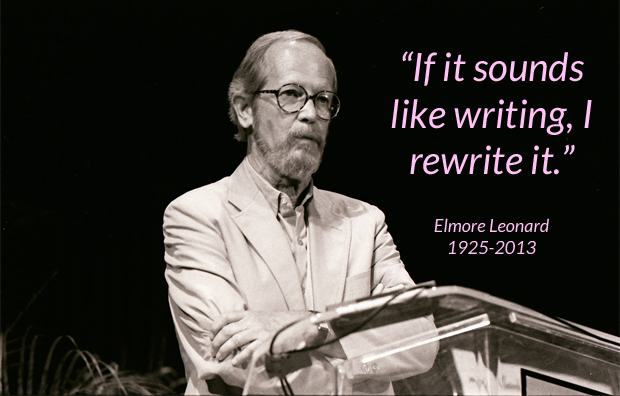Author Resources
Elmore Leonard's 10 Rules of Writing: The Reader's Digest Version

uploaded to WikiMedia Commons by MDCarchives
Best-selling American writer Elmore Leonard created a legacy of great crime literature including Get Shorty, Out of Sight, and Justified, but he also left behind his 10 Rules of Writing. Published as an 89-page book in 2007 and enlivened by his usual terse, no-nonsense but supremely amusing style, we took the liberty to condense it here.
1. Never open a book with weather:
If it’s only to create atmosphere, and not a character’s reaction to the weather, you don’t want to go on too long. The reader is apt to leaf ahead looking for people.
2. Avoid prologues:
They can be annoying, especially a prologue following an introduction that comes after a foreword.
3. Never use a verb other than “said” to carry dialogue:
The line of dialogue belongs to the character; the verb is the writer sticking his nose in. But said is far less intrusive than grumbled, gasped, cautioned, lied.
4. Never use an adverb to modify the verb “said”:
… he admonished gravely. To use an adverb this way (or almost any way) is a mortal sin. The writer is now exposing himself in earnest, using a word that distracts and can interrupt the rhythm of the exchange.
5. Keep your exclamation points under control:
You are allowed no more than two or three per 100,000 words of prose.
6. Never use the words “suddenly” or “all hell broke loose”:
This rule doesn’t require an explanation. I have noticed that writers who use “suddenly” tend to exercise less control in the application of exclamation points.
7. Use regional dialect, patois, sparingly:
Once you start spelling words in dialogue phonetically and loading the page with apostrophes, you won’t be able to stop.
8. Avoid detailed descriptions of characters:
In Ernest Hemingway’s “Hills Like White Elephants” what do the “American and the girl with him” look like? “She had taken off her hat and put it on the table.” That’s the only reference to a physical description in the story, and yet we see the couple and know them by their tones of voice, with not one adverb in sight.
9. Don’t go into great detail describing places and things:
You don’t want descriptions that bring the action, the flow of the story, to a standstill.
10. Try to leave out the part that readers tend to skip.
My most important rule is one that sums up the 10: If it sounds like writing, I rewrite it.
Article provided by Trusted Media Brands, Inc.
By clicking “Request My Free Consultation”, you are providing your electronic signature, voluntarily authorizing LifeRich Publishing and its affiliates to contact you using a manual or automated telephone dialing system and send you advertisement or telemarketing messages by email or text/SMS/MMS message to the address and phone number you have provided above. You are not required to agree to this in order to buy products or services from Balboa Press. You certify that you are over the age of eighteen (18). You’ll get up to ten (10) messages per month. Standard message and data rates may apply. Click here to view our privacy policy.



